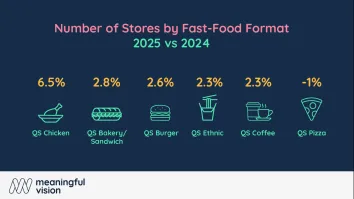
QSR market leaders deconstruct how to manage inflation woes
One solution is to pass on the cost to some degree.
Passing off the cost to consumers to some extent and skilful supply management are just two of the ways some of the top leaders in the quick-service industry are doing to contain inflation.
The topic was discussed in the recently concluded QSR Media Asia Deliverect Conference & Awards 2023 during a panel discussion that saw the decision-makers of brands such as SaladStop!, Subway, Dairy Queen, Gong cha, Potato Corner, and Jamba Juice.
During the leadership panel, Eric Foo, President of Subway Asia Pacific said that managing supply chains means continually looking at new ways to source locally and comparing prices between sources.
“Finding the cheapest cost is not necessarily the best way to manage a business because you need to balance between the cheapest supplier and supply security. This means there will always be some degree of compromising between costs,” Eric said.
Steven Yang, APAC Managing Director for Focus Brands who own brands such as Auntie Anne’s and Jamba Juice said they are actually encouraging franchisees to pass off the cost however to better equip them with how much to pass off, Steven said they go out and collect data on the supply chain of raw materials and benchmark them to each market to compare the difference.
“Because you have suppliers now and it's their opportunity to gauge too. So we have suppliers coming in saying they have to raise the price by 35%. But is that true? So our franchisees come to us and we benchmark against that.” Steven said. “It gives them an opportunity to negotiate and control the inflation but at the same time you have to pass off that cost.”
Michael Bruce, APAC Regional Director for Dairy Queen said that they haven’t seen any negative effects when they did increase prices however, they did focus on ‘premiumization’.
“How do premiumizing the items that we have today that give the customers not just the perception of value but the reality of value? And that’s what’s working with us,” Michael said.
Danny Lee, CEO of Gong Cha APAC reiterates that supply chain management remains the key. He explained that a lot of their products are sourced from Taiwan. Now they are targeting to expand out of Taiwan and increase production facilities out of their home markets.
“The consumers are very selective now because their pockets are tight. If I want to spend $10 where would I go? If we offer consistent quality and continue to create new products that excite the customer, I believe we can maintain our business,” Danny said.
Adrien Desbaillets, CEO of SaladStop! said that they have an in-house tech team to build their own proprietary technology that allows their customers to order through their own system and not rely on third-party vendors. After the upgrade, 60% of all digital orders come from their own system versus 20% before.
“We see that’s going to be something where we can create more value and more ‘premiumness’,” Adrien said.
Meanwhile, for Kathryna Manalo, International Markets Director at Potato Corner, they are doing a lot of volume consolidation across markets. What they aim for is to have a single stock-keeping unit (SKU) across all markets.
This is a particular challenge for the brand as their main market, which is the Philippines do not have high purchasing power for snack-like items such as Potato Corner.
“We have to ensure that the price point is at the acceptable rate compared to competitors and I think supply chain will play a big factor for fighting price increases,” Kathryna said.























